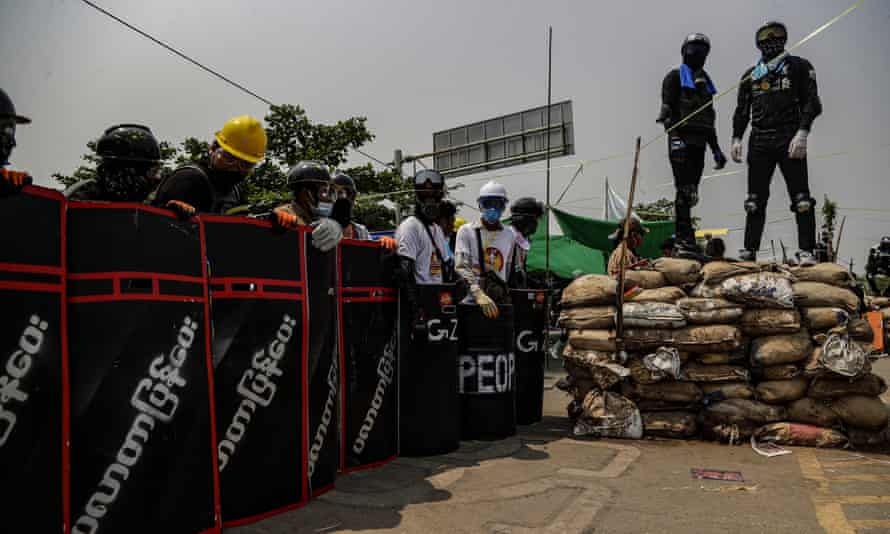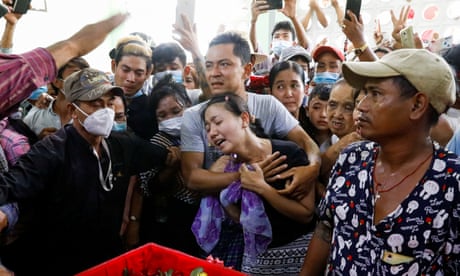Deaths come as US, India, Australia and Japan vow to work together to address crisis in Myanmar

Protesters in Myanmar stand next to their metal shields on the outskirts of Yangon. Photograph: EPA
Reuters
Sat 13 Mar 2021
At least six protesters were killed by security forces in Myanmar, witnesses and media have reported, as activists marked the anniversary on Saturday of a student whose killing in 1988 sparked an uprising against the military government.
Three people were killed and several injured when police opened fire on a sit-in protest in Mandalay, Myanmar’s second biggest city, two witnesses told Reuters. Another person was killed in the central town of Pyay and two died in police firing in the commercial capital, Yangon, overnight, domestic media reported.
“The security forces initially stopped the ambulance from reaching the injured people and only allowed it later,” a 23-year-old protester in Pyay told Reuters, asking not to be named for fear of retribution.
“By the time they allowed it, one of the injured became critical and he later died.”
The deaths came as the leaders of the United States, India, Australia and Japan vowed to work together to restore democracy in Myanmar, where violence has escalated as authorities crack down on protests and civil disobedience.
Local media reported two protesters were killed in police firing in the Tharketa district of Yangon overnight on Friday. DVB News said police opened fire on a crowd that gathered outside the Tharketa police station demanding the release of people arrested.
Posters spread on social media calling on people to come out on the streets to protest against the junta and to mark the anniversary of the death of Phone Maw, who was shot and killed by security forces in 1988 inside what was then known as the Rangoon Institute of Technology campus.
Reuters
Sat 13 Mar 2021
At least six protesters were killed by security forces in Myanmar, witnesses and media have reported, as activists marked the anniversary on Saturday of a student whose killing in 1988 sparked an uprising against the military government.
Three people were killed and several injured when police opened fire on a sit-in protest in Mandalay, Myanmar’s second biggest city, two witnesses told Reuters. Another person was killed in the central town of Pyay and two died in police firing in the commercial capital, Yangon, overnight, domestic media reported.
“The security forces initially stopped the ambulance from reaching the injured people and only allowed it later,” a 23-year-old protester in Pyay told Reuters, asking not to be named for fear of retribution.
“By the time they allowed it, one of the injured became critical and he later died.”
The deaths came as the leaders of the United States, India, Australia and Japan vowed to work together to restore democracy in Myanmar, where violence has escalated as authorities crack down on protests and civil disobedience.
Local media reported two protesters were killed in police firing in the Tharketa district of Yangon overnight on Friday. DVB News said police opened fire on a crowd that gathered outside the Tharketa police station demanding the release of people arrested.
Posters spread on social media calling on people to come out on the streets to protest against the junta and to mark the anniversary of the death of Phone Maw, who was shot and killed by security forces in 1988 inside what was then known as the Rangoon Institute of Technology campus.

Britain advises its citizens to flee Myanmar amid fears of mounting violence
Read more
His shooting and that of another student who died a few weeks later sparked widespread protests against the military government known as the 8-8-88 campaign, because they peaked in August that year. An estimated 3,000 people were killed when the army crushed the uprising.
Aung San Suu Kyi emerged as a democracy icon during the movement and was kept under house arrest for nearly two decades. She was released in 2008 as the military began democratic reforms and her National League for Democracy won elections in 2015 and again in November last year.
On 1 February, the generals overthrew her government and detained Aung San Suu Kyi and many of her cabinet colleagues, claiming fraud in the November elections.
More than 70 people have been killed in widespread protests since then, the Assistance Association for Political Prisoners advocacy group said.
Britain, the former colonial power, warned its citizens in Myanmar to leave on Friday, saying “political tension and unrest are widespread since the military takeover and levels of violence are rising”.
South Korea said it would suspend defence exchanges and reconsider development aid to Myanmar because of the violence.
The Kremlin said Russia, which has close ties to Myanmar’s military, was concerned about the mounting violence and “analysing” whether to suspend military-technical cooperation.
“We evaluate the situation as alarming, and we are concerned about the information about the growing number of civilian casualties coming from there,” Kremlin spokesman Dmitry Peskov was quoted by the Tass news agency as saying.
No comments:
Post a Comment